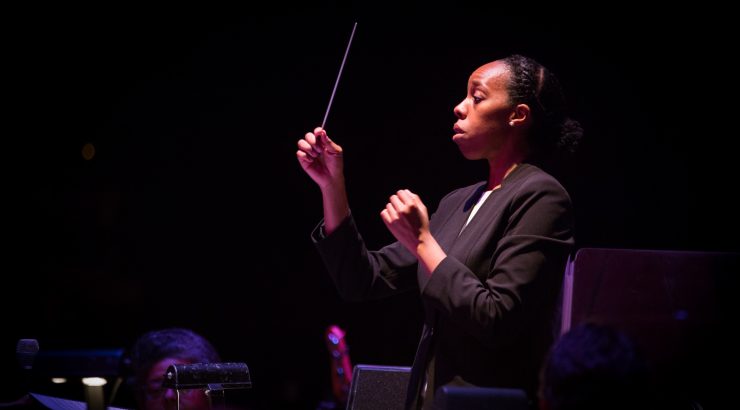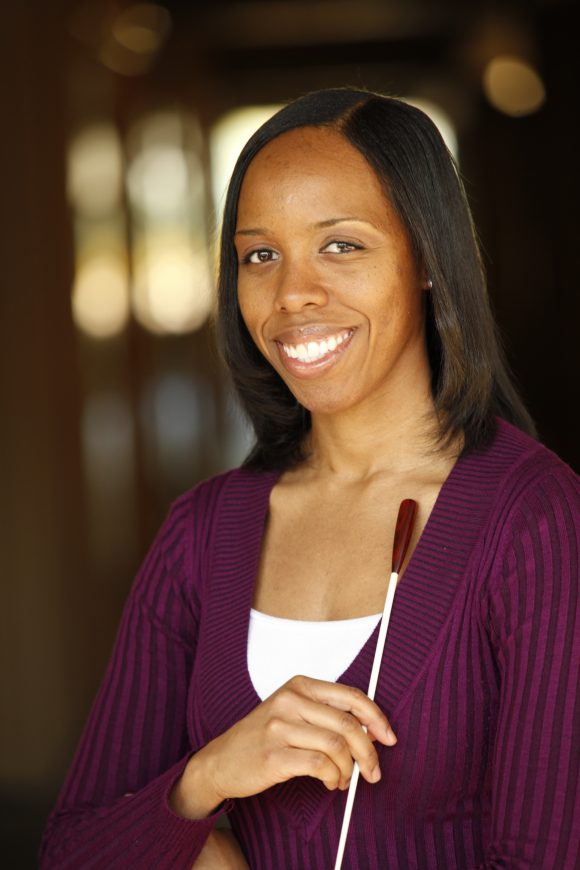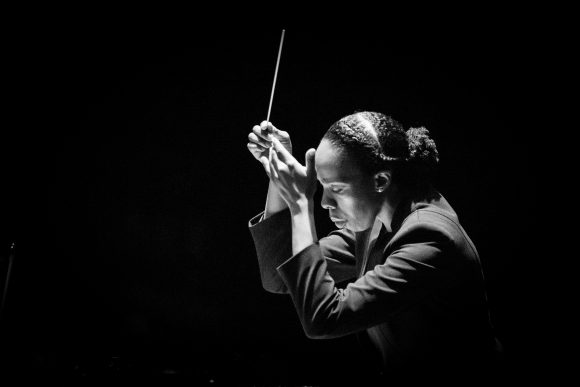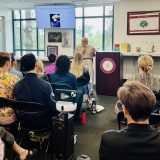
Career Q&A with Kalena Bovell ’09 2020 Distinguished Alumni Award Winner on Conducting, Poetry, and Representation
October 7, 2020
This year’s Distinguished Alumni Award recipient for the College of Performing Arts is Kalena Bovell, who graduated from Chapman University in 2009 with a Bachelor of Music (Pre-Certification, Music Education). Since graduating from Chapman, Kalena has completed her graduate studies at The Hartt School and has made a name for herself as an accomplished conductor as well as a champion for diversity, equity, and inclusion in classical music. Originally from Los Angeles, Kalena currently lives in Memphis, Tennessee, where she is the assistant conductor for the Memphis Symphony Orchestra and the conductor of the Memphis Youth Symphony. Kalena recently joined us for a Career Q&A to tell us more about her career path over the last few years.

Image courtesy of Kalena Bovell
You’ve spoken to us before about the diversity gap in conducting and how you want to be an example to others. Could you tell us more about the work you’ve been in doing in this area?
I’m a huge advocate that representation matters. Especially with my living in Memphis, where the community is predominantly African American and Hispanic. The fact I am an Afro-Latina I think is an added plus because I really feel that I’m able to show this community things that they didn’t think were possible.
In 2019, right before I moved to Memphis, I made my unofficial debut with the Memphis Symphony conducting Leslie Odom, Jr. in a pops concert. And I remember after that concert, so many different patrons from this community were coming up to me saying, “I’ve never seen a Black conductor before,” or “I’ve never seen a Black woman conductor before,” or “I’ve never seen a woman on the podium before.” And at the beginning of that concert when I walked out to take the podium, it was almost like I was in an NFL game because there were just so many cheers, so many people hollering, just this huge welcome. For me, it’s huge, because we—meaning women of color, women, Hispanic women—still don’t exist in classical music. And yes, there are different programs that are starting to bridge that gap, but I think that gap is still being closed too slowly.
Memphis Symphony is really invested in education. One of things we do is side-by-sides. We go into 13 different schools and we put on hour-long concerts with the kids playing side by side next to us. It’s a way to expose kids from all different types of backgrounds—sometimes underrepresented, sometimes affluent—to classical music. And for a lot of these kids who are from underrepresented communities, to see me on the podium is very eye-opening.
At one of those schools we were at, there was this little Black boy who was sitting on the floor behind me and conducting along to every single piece. And as the concert progressed, he got better. And I remember thinking, “Okay, that’s cool, because here’s a young boy who now knows possibility.”
I also did a really important collaboration with Tony Award-nominee Rob McClure. He has a series called Conductor Cam and he reached out to me recently saying that with everything that’s going on in society he wanted to use his platform as a way to bring light to the Black Lives Matter movement. So our video is about passing the baton, where this white male passes the baton to me, a woman of color, who is more qualified but who often doesn’t get opportunities because people of color continued to be marginalized, especially in classical music. So it was a very powerful moment. We did it to Ragtime, and at the very end of the video, he has original cast members from Ragtime, like Audra McDonald and Brian Stokes Mitchell. And I had some of my friends in the video, musicians of color playing. I also happen to be a poet and so I recited one of my poems in this video as well. [Kalena recites “Tethered Voices” at 1:02 mark]
https://www.youtube.com/watch?v=68VYeDKZ9_Y&feature=youtu.be
Do you feel that there’s an overlap between your craft in music and poetry?
Oh, most definitely. Poetry for me has always been about being a voice for other people who didn’t feel as though they could have a voice. And once everything started with George Floyd being murdered, and even with COVID starting, I had no desire to play my violin or to study any score. However, I started getting inspiration to write poetry and within that time I wrote four or five different poems. One of them is called “Tethered Voices,” which is the one that’s spoken in Rob McClure’s video. There’s another one which is called “Ode to the Unarmed” and it’s where I name Trayvon Martin, Emmett Till, Sandra Bland, and Breonna Taylor.
For me, poetry is just another creative medium. There is definitely overlap, because when I hear words, it’s almost like music. It’s kind of interesting, because even as a classical musician, I also love death metal and I love heavy metal and I love alternative. It’s because I’m so enamored with the voice, and how people can use their voice, and how the words can really impact a song. For me, words are impactful. And when I write, there is a rhythm to it, there is a flow to it. So my musical ability definitely plays into that.

Image courtesy of Kalena Bovell
What does a typical day look like as an assistant conductor?
A typical day is honestly very busy. I don’t live as glamorous a life is people tend to think. Typically you’re always studying. Usually, all the repertoire for the season is outlined in advance. Then I can look at the entire season and get all of my scores together, all the music that needs to be learned, and start prioritizing. Last year I got that repertoire list in August and I had 56 different scores to learn for September. And it wasn’t just a movement here, a movement there. No, this was an entire symphony to learn, or several symphonies to learn. I study using the pomodoro method, where you do segments of work, take a break, and then you do another segment of work, take a break. I typically wake up at 6:15 or 6:30 to start my studying. I do a morning session, afternoon, and then an early evening so that I’m usually done by 7:00 and I can enjoy my evening.
There’s also a lot of meetings. And depending on the week sometimes you would have two concerts a week. There was one week where I had three concerts, back-to-back-to-back. And then there are the rehearsals on top of that. And sometimes you’re double-booked.
The assistant conductor life is very busy, honestly. But at the same time it’s so rewarding, just for the amount of people that you get to meet and interact with and for the number of things that you can do in the community. I just think it’s amazing.
What drew you to conducting? What specifically about conducting speaks to you?
Conducting was an accident. I was a music education major so I was convinced I was going to be a violinist. Conducting was never on my radar. But as a music education major we all had to take a year of instrumental conducting and then a semester of choral conducting. I got on the podium and I gave a beat, and I just remember thinking, “Oh my god, what is this?” There was all this sound coming towards me and just by varying my hand motions I would influence that sound. And I just remember thinking, how have I never known about conducting? Why has no one ever told me about this? And so I started becoming even more curious. I started going to all the conducting rehearsals. I would sit in the back, not knowing what was going on, but I just knew that I had to continue finding out what this was. Eventually I audited Daniel Wachs’ conducting classes and took lessons.
Conducting for me is about how you have the ability to stand within the sound and mold it and shape it. And it’s not you alone. You’re bringing 90 or more musicians together to create this idea that hopefully is as close to what the composer had intended. For me, conducting is very much about that collaboration and about that tangibility of being able to mold and shape the sound coming toward you.
Were there any other experiences you had as an undergraduate at Chapman that you feel helped you get to the career you have now?
Being able to work with William Fitzpatrick. Bill is a Black violinist, which was unheard of, so to take lessons from someone who looked like me, and to hear Bill’s story and know the many sacrifices that he made was a huge influence on me. There were times I would go to lessons and wouldn’t play one note at all. But I would go home so incredibly inspired and practice for three hours. And before Daniel Wachs, Mark Laycock was also a huge influence, because with him I saw a possibility as well. He always encouraged and supported his students. And then, my friends. Chapman holds many special memories.

Image courtesy of Kalena Bovell
What kinds of skills are necessary in conducting?
Technical skills, obviously. You need to know what you’re doing on the podium. Because an orchestra does not like when you waste their time. They don’t want to see that you’re practicing your part in front of them.
I think it’s really important that as a conductor you’re passionate, you’re driven, but that you’re also a people person. That you want to get to know people, want to build relationships, and that you’re curious. You also have to have a really strong work ethic because you’re very busy and there are a lot of sacrifices that you have to make. Time management skills are very important, because you’re constantly juggling time for rehearsal, time for studying, time for social life (which is non-existent for the first couple of years, and you realize that).
For me, the most important thing is just being authentic. You have to remember why you got into this business in the first place. If it’s for the fame and for people to know your name, then you might want to rethink why you’re doing this. But if it’s to build relationships and get to know composers, get to know music, then I think you’re in it for the right reasons.
What advice would you give to someone who’s interested in building a career in conducting?
Listen to everything that isn’t classical music. It’s so important to expose yourself to so many different genres and so many different varieties and styles of music. I conduct pops concerts and listening to classical music won’t solely help you do those things if you’re not exposed to those things.
Be very curious, ask a lot of questions. Go to art museums, go to the park. Actually be present in everything that you do. Because it’s that being present that’s going to allow you to bring what you have to an organization and to an ensemble.
Know that it’s going to be a lot of hard work, but it’s hard work that is definitely going to be worth it.
There is always going to be someone who’s going to tell you that you are not capable or that you cannot do what you love to do. And you have to be the one who continually tells yourself, “Yes, I can.”
Just have fun. Perfection doesn’t exist, so stop striving for it.
—
This interview has been edited for length and clarity.
Learn more about Kalena at www.kalenabovell.com.
